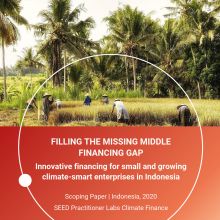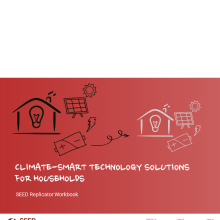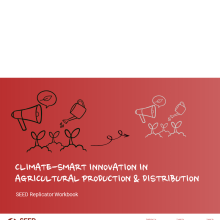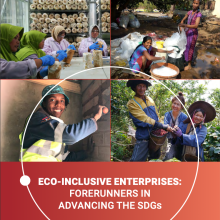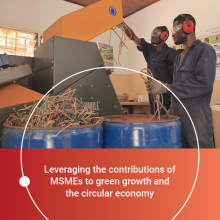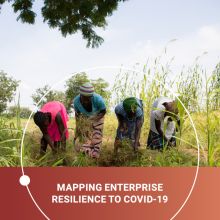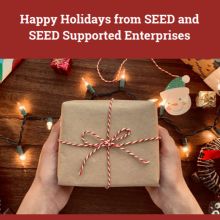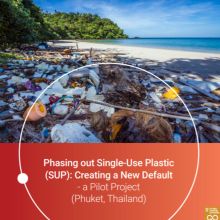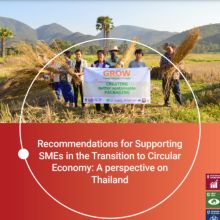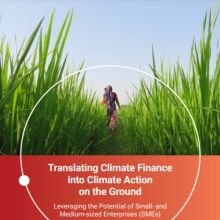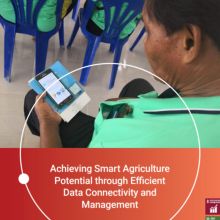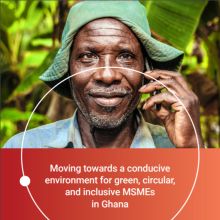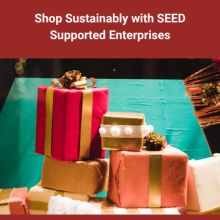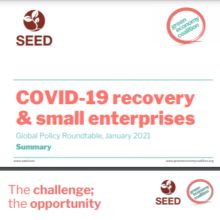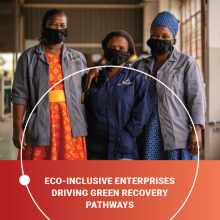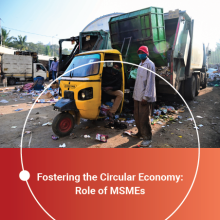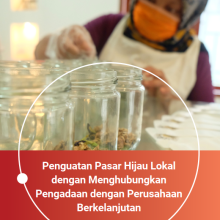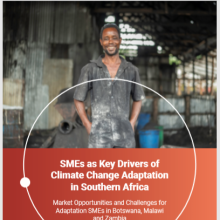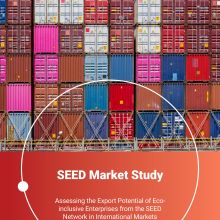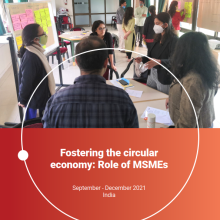- This scoping paper provides the basis for the implementation of the collaborative, multi-step process of the SEED Practitioner Labs Climate Finance in Indonesia in 2020. Indonesia’s richness in biodiversity and vibrant landscape of small- and medium-sized enterprises (SMEs) present a significant opportunity for the country to meet its development objectives while reducing its climate impacts and improving climate resilience across sectors. In particular, climate-smart SMEs – offering products and services for climate change adaptation and/or mitigation – are well positioned to absorb and scale the environmental, social and economic impacts of global climate finance flows in line with Indonesia’s climate action objectives.
- Current amounts of waste generation and insufficient waste management affect ecosystems worldwide negatively. Thus, the waste management sector is a promising area for reducing pressure on our natural resources and carbon emissions. Managing waste through strategies such as rethinking products, reducing resource use and recycling materials contribute towards a more circular economy. Climate-smart solutions presented in this workbook transform waste into entirely new materials, such as pavement tiles, alternative house building blocks, or paper made from grass. Get inspired by proven business models around the globe and learn how to create impactful and innovative solutions around waste management for your community.
- Water is one of the main channels through which people, ecosystems and economies will feel climate change impacts. Missing access to Water, Sanitation and Hygiene (WASH) still poses challenges to people worldwide, while unsustainable products and services can have a big negative impact on both human and environmental health. Access to climate-smart WASH products & services leads to healthier lifestyles on personal and community levels while equally promoting environmental action. With eco-friendly yet innovative products, you can decrease vulnerabilities or tap into a growing market of environmentally-conscious customers. Exploit this potential and set up your own eco-inclusive enterprise providing access to climate-smart WASH products & services. Learn from proven business models around the globe and take the first steps towards offering sustainable solutions to your community.
- Energy production and consumption are the largest sources of global greenhouse gas emissions. Economic development will increase people’s need for access to reliable and affordable energy further. Smart energy solutions focus on making climate-smart technology available and affordable to households. These solutions have the potential to improve living conditions and strengthens the economic conditions of communities. They come from renewable sources, make use of an off-grid design, or, through their energy efficiency and conservation, avoid and reduce emissions. Innovative energy products improve accessibility to climate-smart technology and provide additional capacity-building in rural areas through technical training. Get inspired by a range of proven business models and learnings on how to set up your own enterprise to create such benefits for households in your community.
- Smallholder and subsistence farmers are likely to suffer from rising temperatures and extreme weather events; while on the other hand, agriculture itself is a relevant driver of impacts on the climate. This shows how crucial it is to develop climate-smart ways of production and distribution in agriculture and which important role eco-inclusive enterprises play in contributing to climate change mitigation and adaptation. Climate-resilient farming methods, sustainable value chains, and innovative products and methods bring innovation to the agricultural sector. Contribute to climate-smart agriculture by replicating an eco-inclusive enterprise providing innovations in production and distribution. Get inspired by various proven business models and take the first steps towards agricultural innovations in your own community!
- The policy context as it relates to MSMEs in Ghana is in a state of transformation. With a new MSME Policy on the horizon that seeks to align and coordinate efforts to support this stakeholder group, it is an opportune moment to look at the social and environmental contributions of MSMEs to Ghana’s development priorities, and how policy solutions can leverage these contributions. Furthermore, as MSME activities in specific sectors – for example in the waste management sector – receive increasing attention, there is opportunity for a coordinated effort to address challenges. By bringing together different perspectives and experiences, the SEED Practitioner Labs for Policy Prototyping provides an opportunity to build partnerships and holistic solutions.
- As governments respond to the wide-ranging problems resulting from the COVID-19 crisis, it’s worth thinking about how we may take this opportunity to shift towards a green economy. Because the way we recover from this crisis will impact our fight against climate change and our progress towards achieving the 2030 Sustainable Development Agenda. A green recovery calls for investments in solutions that provide social, environmental and economic benefits to people, especially those in vulnerable and marginalised communities. SEED-supported eco-inclusive enterprises and other Micro, Small and Medium-sized Enterprises (MSMEs) already promote green-technologies while including low-income people in their value chain. The SEED Impact Snapshot helps to reveal the versatility of the impact of eco-inclusive enterprises. It also helps to clarify where there is the biggest potential for their SDG contributions and how policymakers may help unlock that potential further.
- As a leader in the ASEAN region, Thailand’s policy frameworks are well aligned with ASEAN initiatives, UN Sustainable Development Goals (SDGs) and Paris Agreement. Various stakeholders including those in the MSME ecosystem are working towards achieving the Thailand 4.0 industrial policy, a long-term vision to transition the country into an innovation-based economy, with a focus on technology, creativity and services. This policy landscape paper provides a brief overview of the social and environmental impact entrepreneurial ecosystem in Thailand. It serves as the background for the Practitioner Labs for Policy Prototyping hosted by SEED with UNDP Thailand as strategic partner.
- The policy context as it relates to MSMEs in Ghana is in a state of transformation. With a new MSME Policy on the horizon that seeks to align and coordinate efforts to support this stakeholder group, it is an opportune moment to look at the social and environmental contributions of MSMEs to Ghana’s development priorities, and how policy solutions can leverage these contributions. Furthermore, as MSME activities in specific sectors – for example in the waste management sector – receive increasing attention, there is opportunity for a coordinated effort to address challenges. By bringing together different perspectives and experiences, the SEED Practitioner Labs for Policy Prototyping provides an opportunity to build partnerships and holistic solutions.
- Micro, Small, and Medium Enterprises (MSMEs) provide 50% of jobs, contribute to over 35% of the GDP in emerging economies, and overall make up 90% of registered firms across the world. They are especially impactful in emerging economies as they work toward inclusive growth and equality for marginalised populations. At SEED, we focus on growing eco-inclusive enterprises which in turn contribute socially, economically, and environmentally to empowering the 5.2 billion people at the bottom of the pyramid worldwide. This report examines the yearly impact of 80 of our eco-inclusive enterprises in three of our SEED countries: Zambia, Zimbabwe, and Malawi. These locally embedded enterprises, 51% of which are women-led, demonstrate that driving the Sustainable Development Goals (SDGs) can indeed be profitable and with a success rate of 82.5% still in business, they show long-lasting impact in each of their communities and sectors.
- Resilience is an indispensable tool to help MSMEs prepare for the unknown, especially now when COVID-19 induced curfews and lockdowns expose MSMEs to new vulnerabilities. With fewer resources and access to information than larger companies, MSMEs in emerging markets have experienced severe disruptions to their businesses, with around 42% worldwide facing potential failure within six months. This report demonstrates how MSMEs, particularly eco-inclusive enterprises, are weathering the COVID-19 pandemic and how governments and intermediaries can lend support. In this report we outline six essential resilience factors and good practices that SEED’s eco-inclusive enterprises have employed in emerging markets. Our SEED enterprises serve as an excellent example of how other enterprises can incorporate resilience into their business models in the face of the pandemic and to become more adaptable for future shocks.
- The holidays are approaching and like many others around the world, SEED is searching for a way to send gifts and joy to our loved ones from a safe social distance.
- Phasing out single-use plastics (SUP) in Thailand demands a commitment from different sector stakeholders - the private sector, as producer and purchaser of the material, plays an influential role in providing alternatives and realising sustainable consumption and production.
- This Policy Brief from SEED's Practitioner Labs for Policy Prototyping highlights the Stockholm Environment Institute (SEI)'s research on the barriers and challenges faced by the private sector hindering a transition towards sustainable production and adoption of circular economy business models.
- Read the report to learn more about how SMEs in emerging economies help their local communities adapt to and mitigate the impacts of climate change, and how this community engagement paves the way for providing secure livelihoods and a more sustainable future for all.
- Download SEED's Thailand 2020 Policy Brief from the Practitioner Labs for Policy Prototyping to read about ListenField's contributions to achieving smart agriculture potential through data connectivity and management.
- This policy brief investigates how green MSMEs face challenges when accessing finance, finding markets, and navigating a dynamic policy landscape and explores how partnerships between policy makers and ecosystem players can help target support of the MSMEs and overcome these barriers.
- To better support small businesses when you're looking for a unique gift for your friend or family member, we encourage you to shop from our gift guide of eco-inclusive SEED supported enterprises! From home decor to handbags, from fair-trade products to face masks, there’s something in it for everyone!
In January 2021, SEED and the Green Economy Coalition held an online, interactive roundtable gathering small enterprise networks, policy practitioners, NGOs and think tanks to exchange knowledge and share interventions on how to ensure that our Green Recovery efforts are impacting small businesses.
- This snapshot report is intended for national policy makers and shapers; global policy and finance institutions; researchers and civil society networks. Drawing on direct insights from micro, small and medium enterprises as well as eco-system support organisations, it highlights the existing support gaps, concrete examples and new opportunities for catalysing a green, inclusive recovery from COVID-19.
- In this primary edition of a series of reports, we illuminate the black box of eco-inclusive entrepreneurship by providing readers with a first-of-its-kind comprehensive typology on eco-inclusive SMEs.
- This scoping paper provides the basis for the implementation of the collaborative, multi-step process of the SEED Hack for Climate Finance in Thailand in 2021. Thailand’s high environmental richness and fastly evolving landscape of small- and medium-sized enterprises (SMEs) present a significant opportunity for the country to meet its climate action and development objectives. In particular, climate-smart SMEs- offering products and services for climate change adaptation and/or mitigation- are well-positioned to absorb and scale the environmental, social, and economic impacts of global climate finance flows in line with Thailand’s climate action objectives.
- The Circular Economy (CE) policy context as it relates to micro, small and medium enterprises (MSMEs) in India is essential to integrating and mainstreaming the transition to the circular economy in India.
- The Indonesian government has placed a strong emphasis on the development of local economies across the country, and have put into place important steps to align government spending on procurement with this priority. Linking eco-inclusive MSMEs to public procurement opportunities can leverage the potential for MSMEs to drive local sustainable economic development through their growth.
- Pemerintah Indonesia telah memberikan penekanan yang kuat pada pengembangan ekonomi lokal di seluruh negeri, dan telah menempatkan langkah-langkah penting untuk menyelaraskan pengeluaran pemerintah untuk pengadaan dengan prioritas ini. Bersamaan dengan kampanye #BanggaBuatanIndonesia untuk mendorong minat dan permintaan barang dan jasa produksi dalam negeri, Peraturan Presiden Nomor 12 Tahun 2021 tentang Pengadaan Barang dan Jasa Pemerintah (“Peraturan 12/2021”) mewajibkan Kementerian, Lembaga, dan Pemerintah Daerah untuk menggunakan setidaknya 40% anggarannya untuk mendapatkan produk dalam negeri dari usaha mikro dan koperasi. Prioritas untuk mendukung usaha mikro, kecil dan menengah (UMKM) untuk mengakses pasar melalui belanja pemerintah berpotensi mendorong upaya pemulihan ekonomi di tingkat lokal dan nasional.
- The report expands the still-nascent body of case study-based literature on adaptation entrepreneurship, and is thus suited for academia and practitioners active in this field. It is the first one to identify opportunities for successful adaptation entrepreneurship as well as barriers to growth and scale in the region.
- Manifested through the SDGs and the Paris Climate Agreement, the international community has agreed to tackle prevalent economic, environmental, and social challenges, whereby the private sector and businesses can make a pivotal contribution. This report analyses the international market potential of end-consumer products offered by enterprises from the SEED network from a supply and demand perspective, as well as identifying possible avenues for support.
- This policy brief looks at the role of MSMEs in catalysing the circular economy in India, and puts forward some recommendations and policy solution prototypes to support and unlock circular economy entrepreneurship. The recommendations and prototypes were developed as part of the SEED Practitioner Labs for Policy Prototyping in India, 2021.
- The purpose of this Driving Green Recovery Pathways in South and Southeast Asia: Insights from Micro, Small, and Medium-Sized Enterprises and Intermediaries report is to showcase the importance of green and social MSMEs to drive Green Recovery and identify the supports that the intermediary and policy could provide. The insights in this report are derived from The Green Recovery Forum: Leveraging the contributions of MSMEs to achieve the Sustainable Development Goals.

